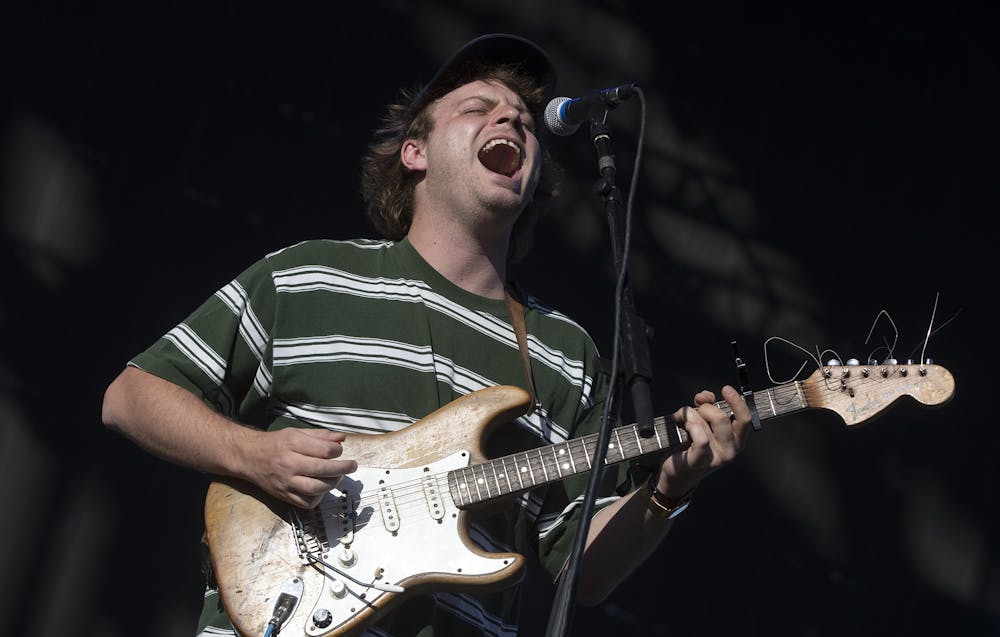Especially in the world of music, it’s rare that a work’s inspiration is tied so closely and apparently to its execution. No matter the artist’s intention or ability, there is always something lost in translation from experience to artwork.
Mac DeMarco’s most recent album, “Five Easy Hot Dogs,” is not an exception to this rule, but it comes damn close. Having been inspired by travel, the instrumental work meanders from tune to tune, invoking the sound of an untethered mind.
The specific excursion that sparked the creation of “Five Easy Hot Dogs” was an international road trip DeMarco took beginning in Gualala, California, stretching through the U.S. and Canada and ending in Rockaway, New York. According to Pitchfork, DeMarco imagined this trip as a sort of hollow tour, traveling with no obligations and playing no shows, but using novelty to fuel the creative process.
Beginning with “Gualala,” DeMarco’s sound is immediately apparent. Soft, layered acoustic guitar accompanies a sparse and pointed synth melody while bass and metronomic drums keep time.
Related: [Ready to rock: local performances this week]
Like much of this album, the song’s soft groove is repetitive, providing a soothing soundscape in which it becomes easy to get lost. It keeps itself from getting stale, though, through its mellow, laid-back feel which doesn’t emphasize any particular instrument and creates a smooth texture.
“Portland 2” is about as intense as this album will allow. It opens with harmonized pan flutes over acoustic guitar arpeggios and bass, alternating between the flutes and a synth melody on the B-section. Although it remains rather subdued, it incorporates some groove in the bass and guitar, creating a texture that isn’t exactly danceable, but will provoke some head-nodding.
Each song on “Five Easy Hot Dogs” presents itself as a snippet. It’s usually clear what the original idea was and how it was fleshed out to create a proper tune. This sort of compositional transparency is not common and I would guess it arises due to the spontaneous nature of these songs’ creation.
This effect is especially obvious on “Vancouver,” whose opening three-note guitar refrain forms a majority of the melodic content and was likely the inciting incident for the tune. “Vancouver” also demonstrates a subtle groove with the repeating guitar taking something of a back seat to the more prominent drums and bass.
Related: [COLUMN: ‘Gossip Girl,’ like Serena, just had to go]
Another interesting thing about the album is its overarching, contiguous feeling. The songs flow into each other nicely, and it can be easy to miss the boundaries between them, giving the effect of more gradual change. This is due in no small part to the consistency in texture across the board, as DeMarco worked with limited instrumentation in his mobile studio.
It ends on “Rockaway,” which is melodically similar to “Gualala.” Beginning with guitar, bass and drums, it folds in a mellow synth when the melody changes. This was the only song on the album whose repetitive nature began to irk me. This is, I think, mainly the guitar’s fault, whose chord strumming could use just a little variation.
It's difficult to say that DeMarco’s newest work is a must-listen. With its low-stakes, low-intensity approach, it doesn’t jump out at the listener or provide any sort of exceptional emotional reaction. No doubt owing to its nomadic origin, it seems better suited to soundtrack a road trip or a study session than an intensive listen.
This isn’t to say it falls short, though; despite the pervasiveness of its meandering quality, each song sounds deliberately performed and carefully constructed, indicating an intention behind the album’s lack of impassioned fervor. It’s a calm, light jaunt that’s perfect for the traveler’s soul.




